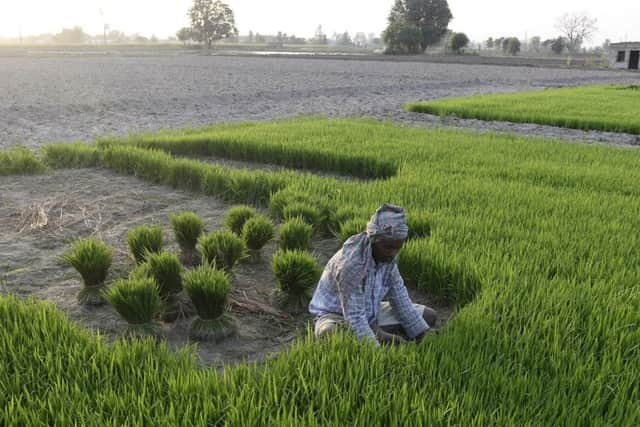Brian Monteith: Climate change isn’t the biggest threat to life on Earth
Is the human race about to become extinct in the next 50 years? Really? Last Wednesday London, Edinburgh and other UK cities found some of their city centre roads closed and traffic brought to a halt by demonstrators. The intention was to alert us to an escalating peril where the combination of a growing world population, finite resources and a change in the climate will lead to the extinction of not just many animals we take for granted – but mankind.
The call for action would see the way we go about our lives change beyond all recognition and consign to distant memory the standard of living that has been achieved for the masses. Without uber-green policies are we really about to become extinct?
Advertisement
Hide AdAdvertisement
Hide AdEver since I developed any political awareness, or sense of community and history – going right back to watching the news of President Kennedy’s death on television and how upset my parents were by that, or being taught Scots Wha Hae in primary class along with hymns and psalms – I have heard and lived through warnings of our impending doom. Today’s demonstrators appear to think it is something new, but I can assure them it is not. The regular testing of police box air raid sirens would remind my generation when still in our shorts how we might all be turned to ash if Soviet nuclear bombers or intercontinental ballistic missiles dropped the Bomb on us.


The Cuban Missile Crisis was still fresh in my parents’ minds, and as I became a teenager only North America and Australasia did not have the presence of Soviet troops or their proxies seeking to gain the upper hand. Film and television were replete with harrowing movies such as Michael Crichton’s The Andromeda Strain or BBC’s Doomwatch warning of ecological disaster or unexpected catastrophe. These put the fear of death into us while later the introduction of SS-20 missiles by the Soviets and Nato’s response of Pershing II and Cruise missiles naturally raised the temperature. The result was the growth of CND with its marches and encampments of the ’80s.
There were famines, droughts and natural disasters being beamed by satellite directly into our living rooms – all while the world’s population kept growing. No wonder that talk of a Malthusian end to mankind was a regular topic. I don’t know how we held our nerve, but we did.
And thank goodness for that; because by holding out for open pluralistic societies governed through democracy rather than the centralist planning of authoritarian and totalitarian regimes – or “world government” as it was euphemistically called – we have surprised all the doom merchants and achieved what might be properly called a miracle.
I am indebted to the work of my old friend Marian Tupy, editor of Humanprogress.org, for reminding me this Easter just how fortunate we are. In one of his regular bulletins of how we are doing better, he lists how only 150 years ago life expectancy in Europe was 36 years and for the rest of the world only 30. Today it is 81 and 72 years respectively. Two hundred years ago in 1820, some 90 per cent of humanity lived in extreme poverty, but today less than 10 per cent does.


If we go back further to 1800 we can compare some amazing facts with now. In 1800 some 43 per cent of children died before their fifth birthday, but today, less than four per cent do. In the same year 88 per cent of the world’s population was illiterate but that is now 13 per cent.
In 1816, a minuscule 0.87 per cent of the world’s population lived in what we would recognise as a form of democracy, but by 2015, 56 per cent did – and today’s democracies enjoy a far wider franchise too.
In the France of 1800, which was then one of the most advanced countries in the world, calorie consumption per person per day was a mere 1,846 calories. By 2013, food supply per person per day in Africa, the world’s poorest continent, amounted to 2,624 calories.
Advertisement
Hide AdAdvertisement
Hide AdSlavery, which was rampant in most of the world in 1800 and – contrary to myth – was endured by all races, is now illegal in every country. Most significantly, for the first time since the start of industrialisation in the mid-18th century, global inequality is declining as developing countries catch up with the developed world. All of this has been achieved at the same time as the world’s population has increased from one billion in 1800 to 7.2 billion today and will increase by another billion over the next 12 years and reach 9.6 billion by 2050.
Rather than move towards extinction, our ability to develop new technologies and to spread democracies has seen us wipe the old scourges of famine and drought from the Earth with the exception of where there is war. We can also see that famine and drought do not happen where there are democracies – and democracies also do not tend towards war with each other, but fall into it when their democracies perish.
In the same week that protesters were causing havoc that resulted in even greater creation of carbon gases as commuters jumped into taxis and traffic was rerouted, India has leapt ahead of France and the UK to become the fifth largest economy in the world. India still has a huge problem with poverty but even as its population grows to 1.34 billion – only just behind that of China at 1.39 billion – we can see how scientific technology, especially in the development of disease- and pest-resistant crops, along with democratic choice, is delivering better living conditions not for the few but the many. Compared with capitalism, socialism sucks.
What will imperil these improvements are the policies of the demonstrators who cannot see that, for example, the introduction of fracking in the US allowed it to introduce cleaner and cheaper fuels that also contributed to it reducing its carbon emissions, even though it did not sign up to the Kyoto or Paris accords.
Their impositions of drastic restrictions on commerce will hold back advancement and raise the prospect of poverty rising and as living standards fall – leading to resource disputes and authoritarian and totalitarian governments. Such regimes bring war, and war brings famine and drought.
If we want to avoid extinction, extinguishing socialism in all its guises should be our priority.
•Brian Monteith is a director of Global Britain